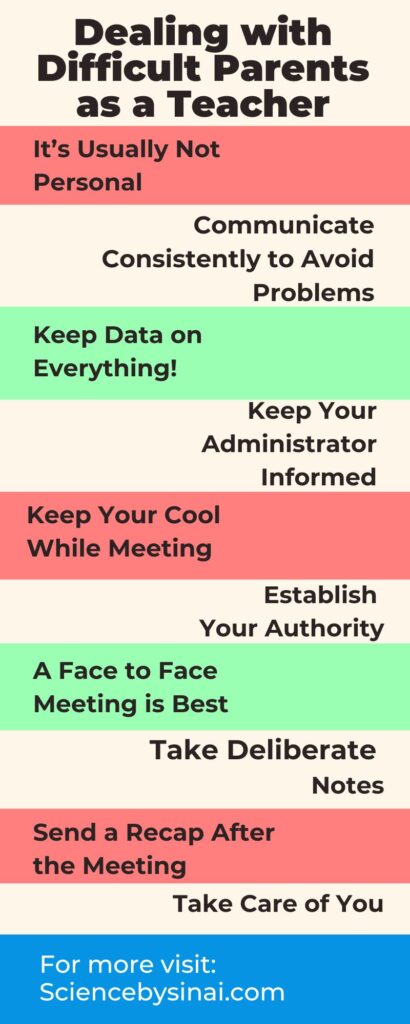Dealing With Difficult Parents as a Teacher
Are you dealing more and more with difficult parents in your teaching job? Have you received an unexpected nasty email? Has a parent become angry about something in your classroom? What strategies can you use to diffuse the situation?

Dealing With Difficult Parents as a Teacher
Updated Sept 19, 2022
Dealing with difficult parents, as a teacher, can be very unnerving, especially if the parent is much older than you! I remember when I first started teaching that most of the parents were the same age as my parents! The idea of standing up to them was super intimidating!
If you have everything organized, and “all of your ducks in a row”, then YOU become the professional in any conversation. It is your classroom and you set the parameters and expectations. Being loaded with data in hand, plus the confidence of organization, goes a long way when dealing with someone who is angry. Using the tips below consistently will make dealing with situations easier each time.
It’s Usually Not Personal
So much is going on in everybody’s busy lives. Sometimes the smallest trigger can send people over the top in terms of temper. You are dealing with the parents’ most precious commodity, which is their children. The “mother hen“ side of parents will come out very quickly if they feel like their child is being wronged. Unfortunately, you may receive the brunt of the defensive attacks!
You need to put it into your mind that it is rarely personal against you. Even though it is your classroom, and it may be something that they disagree with, it doesn’t necessarily mean they are against you as a person. If you understand that from the front end, it will help tremendously with keeping calm and being empathetic toward the parent.
If you take everything personally, it will be very hard to control your emotions whether it be getting upset or angry. One of the biggest challenges of being a teacher is keeping calm when your emotions are in turmoil. If someone in your everyday life spoke to you the way some of the parents talk to teachers, you would not tolerate it. In fact, you would probably give it right back. We are in a situation where that is not possible and it demands A LOT of self-control.
Communicate Consistently to Prevent Difficult Parents
Keeping yourself organized and communicating clear instructions and expectations, from the first day of school, will help tremendously during the entire school year.(First Day of School in Middle School Science) Parents want organization and a clear understanding of what is expected of their child. Almost every encounter teachers have with a difficult parent stems from communication breakdown.
Take your time to write out how to do a project with clear modeling. Keep in mind both auditory and visual learners when introducing a multi stepped task. A bigger project or test may warrant a letter home to describe the content. Having written instructions for all activities leaves a paper trail that is hard to dispute.(Science Projects-10 Questions to Ask Yourself Before Assigning One)
Keep Data on Everything!
Keep data on EVERYTHING. I recommend keeping a teaching journal (7 Reasons Why You Should Keep a Teacher Journal) so you can jot down events that happen each day. This becomes very powerful when it comes time to speak to a parent. If you have electronic communication, or an email system with the parents, I highly recommend you document any behavior or academic issues. This may annoy the parents, and they may choose to ignore the emails, but you now have a paper trail that is powerful.
Years ago I had a parent tell me that I had never told her that her student was not doing well academically and behaviorally. I had been carefully sending emails to her throughout the year. When it came time for her to apply to a private high school, she suddenly said that no one told her that there were problems. I simply printed out every email that was sent throughout the year, stapled it all together into a large packet and gave it to my administration. I didn’t hear anything else since then.
Since I use digital science notebooks in my classroom, with Google slides, I always have the student notebooks at my fingertips that I can pull up and show a parent. I have also shared the entire notebook with a parent so that they can keep tabs on their student. This has been a real game changer!
Keep Your Administration Informed
Administrators hate surprises. When you send home emails, be sure to include a “cc email” to someone at the head of the department or the principal. Luckily, I have a principal who is happy to be included so that he can be informed if the parent should ever contact him directly.
It can be very annoying, but unfortunately common, for a parent to bypass the teacher completely and go directly to the administrator with grievances. No administrator wants to find out the parent side of the story first and then have to go find the teacher’s version. Always include your principal in the loop EARLY in any situation.
Stay Cool While Dealing with a Difficult Parent
Practice strategies for keeping cool doing an encounter with a difficult parent. As goofy as it sounds, practice what you will say in front of the mirror and watch your facial expressions. An irate parent will be looking for the slightest reason to call you insolent and offensive. That doesn’t mean to keep a fake smile on your face. Work on keeping an empathetic and listening face. It is far from easy, but it is very necessary.
When talking, keep your voice slow and calm. If the parent continues to escalate there is nothing wrong with saying “please stop, I am not comfortable with this conversation right now. Let’s schedule a meeting at a later date with an administrator present”. If the parent persists, you should leave the room and find another staff member.
It is important to remember that NO PERSON, parent or not, has a right to insult you or speak to you harshly. You are NOT obligated to endure verbal abuse.
Always make sure that a staff member or administrator knows that you are having a meeting with a parent, even if you don’t foresee it being difficult. I have had occasional, unexpected blow ups from parents that seemed relatively calm at other times.
Establish Your Authority During the Conversation
Your body language and demeanor must show that you are not nervous or questioning your decisions. Not as easy as it sounds! Be confident with your answers and remember that you are in charge of your own classroom!
Using statements such as “My policy is…” and “In my classroom we…” helps establish your authority.
This doesn’t mean you can’t admit to an error that you may have made. In fact, if you politely admit to human error and bring solutions to correcting the problem, most parents will back down. An unreasonable person will not care and will continue to rant. In this case, the conversation needs to be politely ended.
A Face to Face Conversation is Best
In the era of technology, it is easy to send a scathing email or even a ranting voicemail. However, a face-to-face interaction can help diffuse most angry people. I highly prefer Zoom, for the face-to-face factor, but also for the wonderful feature of being able to record it!
Quite often a phone call, or even a face-to-face conversation, can end up having a lot of “he said, she said”. Having the conversation recorded leaves no doubts.
If I sense that there is even a possible uncomfortable situation, I will ask my administrator to sit in the meeting with me. I’ve been teaching for over 30 years so it is not a lack of confidence. It is the annoyance of being misinterpreted or deliberately misquoted. If time doesn’t allow this to happen, then that’s why I prefer Zoom.
Take Deliberate Notes While Meeting With a Difficult Parent
During the meeting, take notes in a deliberate matter to show that you are listening well. Repeat back to the parent what was said while referring to the notes. Even the most angry parent will acknowledge that you are listening. If you come up with a solution together, write that down.
Make sure that you follow through with whatever recommendations you made or you will have a repeat encounter!
Do Not Let the Meeting Get Too Long
Do not let the phone call, Zoom call or meeting go on forever. It is a good idea to set specific times for the beginning and end of the meeting. An upset parent will continue to reiterate which can lead to an escalation of frustration. If the main ideas of a conversation were laid out and addressed, it is time to end the meeting in a prompt way with definite goals in mind.
Send a Recap After Your Conversation
After the meeting, send an email recapping the concerns that the parent had and the strategies that you came up with together. Make sure that you include your administration in a CC email. This shows your professionalism and is one more piece of your paper trail. This is necessary even if your administrator was present at the meeting.
The Meeting May Give You a New Insight Into the Relationship Between the Student and the Parent
The meeting may help you understand the relationship between the parent and the student. If the parent is so passionate about different aspects of education, the child is probably getting a good dose of the anger as well.
Strategize what you can do to alleviate parental stress. Can you make your due dates longer? Can you model the expectations more clearly? Can you help the student with coping strategies that will help him at home as well?
Take Good Care of Yourself
Don’t bring the stress of dealing with a difficult parent home with you. Don’t load it on your spouse, your coworker or your parent. If you really need to release, write it all out in your journal and then go do something that you find calming and enjoyable!
Our relationship with the parents is a small, but important part, of the big puzzle of teaching. We don’t want it to keep us away from our love of creating great lessons and enjoying the students.













Thank you for this clearly written article .
I recognize several mistakes I made last year and hope to rectify them this year.
I appreciate your feedback! It took me a long, long time to get where I am now. I wish I knew some of this when I first started teaching.
I love these ideas